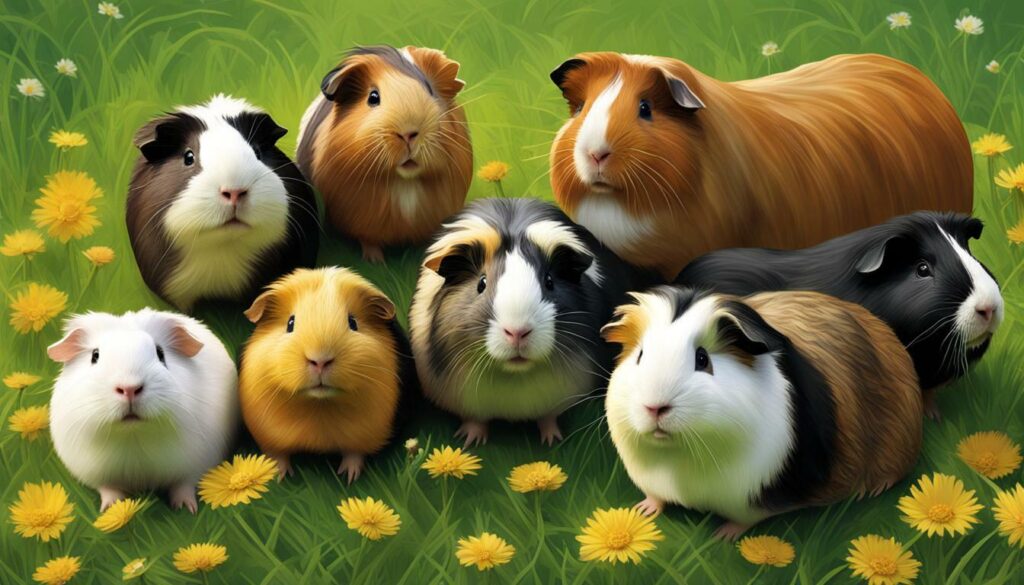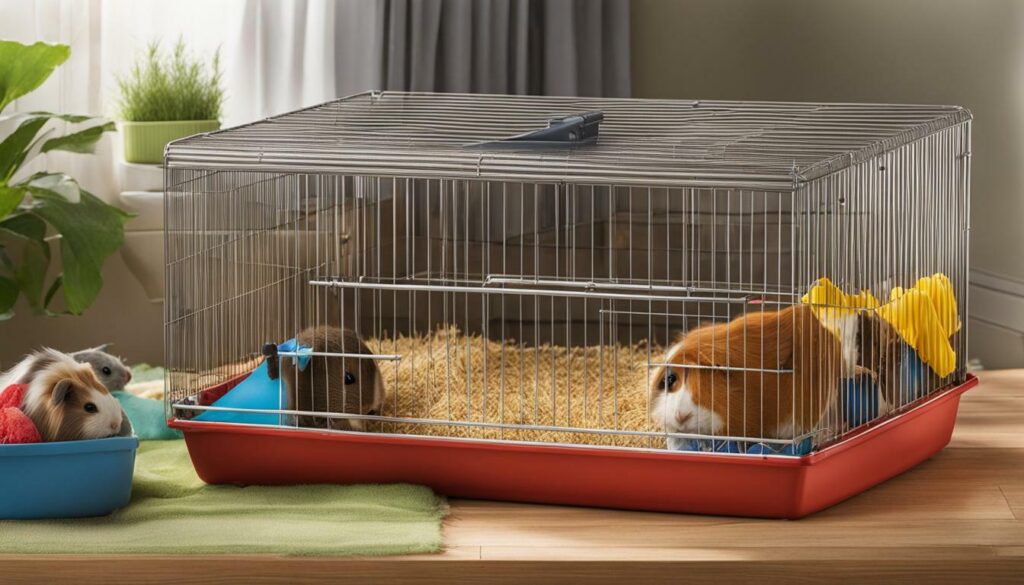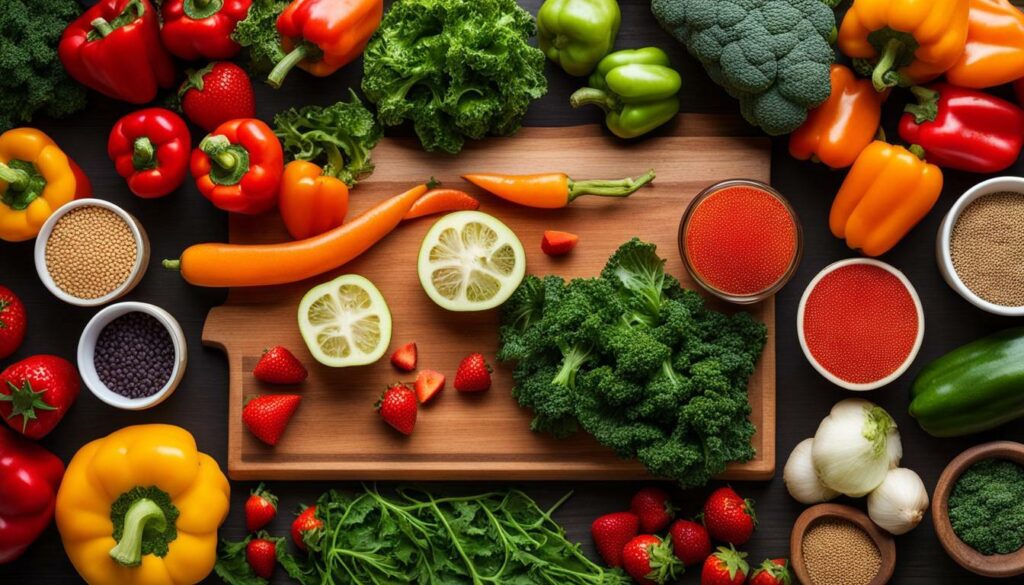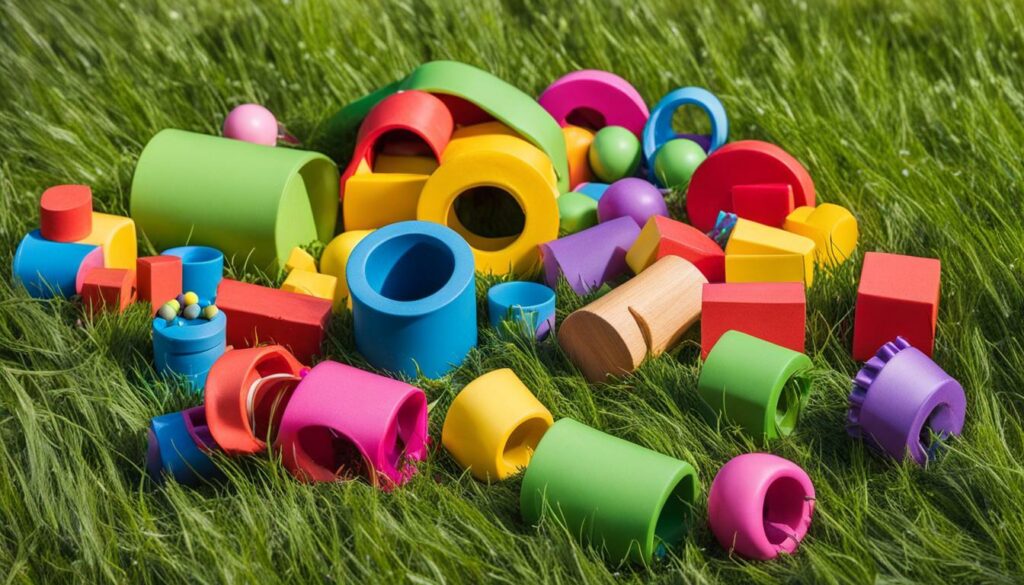Are you considering getting a guinea pig as a pet? Discover essential tips for raising healthy guinea pigs to ensure their well-being and longevity.
Raising healthy guinea pigs involves providing care, the right food, mental stimulation, and security. Guinea pigs are intelligent animals that need companionship and mental stimulation. It is important to research different breeds of guinea pigs and consider their characteristics before choosing one. Guinea pigs are social animals, so they should ideally have at least one companion. Guinea pigs can be kept indoors or outdoors, but enclosures should be weatherproof and offer protection. It is important to obtain guinea pigs from reputable sources and to ensure they are healthy before bringing them home. A healthy guinea pig should have clear signs of good health, and it is important to be prepared with all necessary supplies before bringing them home. The diet of guinea pigs should consist of grass hay as the cornerstone, supplemented with fresh greens and a small amount of fortified food. Environmental enrichment is important for guinea pigs to keep them entertained and mentally stimulated. Guinea pigs should be kept safe from household hazards. Handling guinea pigs requires gentle and firm handling, with support provided for their legs. Regular veterinary check-ups are important for guinea pigs to ensure their health. Guinea pigs have specific housing requirements, including a spacious cage with a solid floor and multiple hiding places. Essential supplies for guinea pigs include age-appropriate fortified food, hay, chews, water sources, a food bowl, a large habitat, and litter and bedding material. Monitoring the health of guinea pigs is essential, and any concerning symptoms should be addressed with a veterinarian.
Key Takeaways:
- Research different guinea pig breeds and consider their characteristics before choosing one as a pet.
- Guinea pigs are social animals and should ideally have at least one companion.
- Obtain guinea pigs from reputable sources and ensure they are healthy before bringing them home.
- Provide a balanced diet consisting of grass hay, fresh greens, and fortified food.
- Enrich the guinea pig’s environment with toys and mental stimulation.
Choosing the Right Guinea Pig Breed for Your Lifestyle
With various breeds of guinea pigs available, it’s important to select the right one that suits your lifestyle and preferences. Different breeds have distinct characteristics and temperaments, so it’s essential to do your research and choose the perfect match for you.
One popular breed is the American guinea pig, known for its short, smooth coat and friendly nature. They make great companions and are relatively easy to care for, making them suitable for first-time guinea pig owners. If you prefer a long-haired guinea pig, consider the Peruvian or Silkie breed. These adorable fluff balls require regular grooming to keep their coats free of tangles.
If you have limited space or live in an apartment, the Abyssinian breed might be a good choice. They have a unique coat pattern and a playful, curious personality. For those who prefer a compact size, the Skinny pig or the Hairless guinea pig is a suitable option. These unusual breeds are virtually hairless and require additional care to protect their sensitive skin.
When selecting a guinea pig breed, consider your lifestyle and the amount of time you can dedicate to their care. Some breeds may have specific dietary or grooming requirements, so it’s crucial to understand their needs before bringing them home. Remember, guinea pigs have a lifespan of 5 to 7 years, so choose a breed that will bring you joy and companionship for years to come.

| Breed | Description | Temperament |
|---|---|---|
| American | Short, smooth coat | Friendly and social |
| Peruvian | Long, flowing coat | Require regular grooming |
| Silkie | Long, silky coat | Require regular grooming |
| Abyssinian | Distinct coat pattern | Playful and curious |
| Skinny pig | Virtually hairless | Require extra skin care |
Remember, each breed has its own unique qualities, so take your time to learn about their specific needs and behaviors. Guinea pigs can bring immense joy and companionship, so choose wisely and enjoy the rewarding experience of raising a guinea pig that perfectly suits your lifestyle.
Providing Companionship: The Social Nature of Guinea Pigs
Guinea pigs thrive on companionship, making it essential to provide them with a furry friend to keep them mentally stimulated and happy. These intelligent animals form strong bonds with their companions and can suffer from loneliness when kept alone. Having a companion not only provides social interaction but also encourages natural behaviors and reduces stress. It is important to note that guinea pigs should be introduced gradually and monitored closely during the bonding process to ensure compatibility.
When choosing a companion for your guinea pig, it is essential to consider their temperament and compatibility. Guinea pigs have distinct personalities, and not every pairing will be successful. It is advisable to introduce guinea pigs of the same sex and similar age to minimize any potential conflicts. A neutral space should be used for the initial introduction, and supervision is necessary to prevent any aggressive behavior. Patience and careful observation are key to successful bonding.
Once a bond is established, you will notice that your guinea pigs become happier and more active. They will engage in playtime together, groom each other, and communicate through a variety of vocalizations. The companionship provides mental stimulation that is vital for their overall well-being. Remember, a happy guinea pig is a healthy guinea pig!

Creating the Perfect Habitat: Indoor or Outdoor?
When it comes to housing your guinea pigs, you’ll need to decide whether to keep them indoors or create an outdoor habitat that meets their needs. Both options have their advantages, so it’s important to consider your specific circumstances and the well-being of your furry friends.
Indoor housing provides several benefits, including protection from predators, extreme weather conditions, and exposure to certain diseases. It allows you to closely monitor your guinea pigs’ health and provide a controlled environment. A spacious cage with a solid floor is essential to prevent injury and provide a comfortable living space.
| Indoor Housing Pros | Indoor Housing Cons |
|---|---|
|
|
“Indoor housing provides several benefits, including protection from predators, extreme weather conditions, and exposure to certain diseases.”
On the other hand, outdoor habitats can offer more space for guinea pigs to explore, as well as fresh air and natural sunlight. However, it’s crucial to create a secure and weatherproof enclosure to protect your guinea pigs from potential threats. The enclosure should include hiding places, such as tunnels or shelters, to provide a sense of security.
Whether you choose indoor or outdoor housing, the well-being of your guinea pigs should be your top priority. Regular cleaning, maintaining proper ventilation, and providing comfortable bedding are essential for both options. Additionally, ensure your guinea pigs have access to fresh water, age-appropriate fortified food, and a constant supply of grass hay, which serves as the cornerstone of their diet.

If you opt for indoor housing, it’s important to create a safe and comfortable environment for your guinea pigs. Here are some key considerations:
- Choose a cage with a solid floor to prevent injuries.
- Select a spacious cage that allows guinea pigs to move around comfortably.
- Provide hiding places, such as tunnels or igloos, to fulfill their natural instinct to seek shelter.
- Use safe and comfortable bedding materials, such as aspen shavings or fleece liners.
- Ensure proper ventilation to maintain good air quality.
Remember, no matter where you decide to house your guinea pigs, providing a loving and nurturing environment is crucial for their overall well-being. Regular interaction, gentle handling, and mental stimulation are just as important as their physical surroundings.
| Outdoor Housing Pros | Outdoor Housing Cons |
|---|---|
|
|
Whether you choose indoor or outdoor housing, always prioritize the health and safety of your guinea pigs. Regularly monitor their well-being, provide a nutritious diet, and consult with a veterinarian for any concerns or guidance. With the right habitat and care, your guinea pigs can thrive and bring joy to your life.
Ensuring Healthy Guinea Pigs: Selecting Reliable Sources
Before bringing a guinea pig into your home, it’s crucial to source them from reliable and trusted places to ensure their overall well-being. Guinea pigs are sensitive animals, and getting them from reputable breeders or adoption centers guarantees that they have received proper care and have a lower risk of health issues. Reputable sources prioritize the health and welfare of guinea pigs, providing them with appropriate diets, regular veterinary check-ups, and suitable living conditions.
When selecting a source for your guinea pig, consider breeders who have experience and knowledge about the particular breed you desire. They can offer valuable guidance on the breed’s specific requirements and provide important information on their care and behavior. Adoption centers are also excellent options, as they often have guinea pigs that need loving homes. They ensure the guinea pigs are healthy and often provide crucial information about their temperament and compatibility with other animals.
Once you have found a potential source, it’s essential to evaluate the conditions in which the guinea pigs are kept. Check the cleanliness of the facility, ensuring that the animals are housed in clean and spacious enclosures. Observe the guinea pigs themselves for signs of good health, such as bright eyes, shiny fur, and a healthy weight. Reputable breeders and adoption centers will allow you to interact with the guinea pigs, which gives you the opportunity to assess their friendliness, activity level, and overall well-being.
| Signs of a Healthy Guinea Pig: | What to Look For: |
|---|---|
| 1. Bright, clear eyes | – Free from discharge or redness |
| 2. Shiny, clean fur | – No signs of bald patches, matting, or parasites |
| 3. Active and alert behavior | – Curious, exploring their surroundings |
| 4. Normal eating and drinking habits | – Showing interest in food and drinking water regularly |
| 5. Good weight and body condition | – Neither too thin nor overweight |
Remember, bringing a guinea pig into your home is a commitment that can last up to seven years or more. Therefore, ensuring you choose a healthy guinea pig from a reliable source sets the foundation for a long and happy companionship.

A healthy guinea pig displays specific signs of good health that owners should closely observe to ensure their pet’s overall wellness. By being aware of these signs, you can identify any potential health issues early on and take appropriate action. Here are some key indicators of a healthy guinea pig:
- Smooth and shiny coat: A healthy guinea pig has a coat that is smooth, shiny, and free from bald patches or excessive shedding. The fur should be clean and well-groomed, without any signs of matting or discoloration.
- Bright eyes: The eyes of a healthy guinea pig should be bright, clear, and free from discharge. Any signs of cloudiness, redness, or excessive tearing could be a sign of an underlying health issue.
- Clear nose and ears: A healthy guinea pig should have a clean and dry nose, without any discharge or crustiness. Similarly, the ears should be clean and free from debris or signs of infection.
- Good appetite: A healthy guinea pig has a healthy appetite and enjoys eating. They should show enthusiasm for their food and exhibit normal eating behaviors, such as chewing and grinding their teeth.
- Normal weight: Maintaining a healthy weight is crucial for guinea pigs. A healthy guinea pig should have a well-rounded body shape with no visible protruding bones or excessive weight gain.
- Active and alert: Healthy guinea pigs are curious, active, and display a playful nature. They should show interest in their surroundings, respond to stimuli, and engage in normal guinea pig behaviors.
- Regular urination and bowel movements: A healthy guinea pig has regular urination and bowel movements. Any significant changes in the frequency or consistency of their waste could indicate an underlying health issue.
- Normal breathing: Guinea pigs have a distinctive breathing pattern, characterized by regular and quiet respiration. Labored breathing, wheezing, or any signs of respiratory distress should be closely monitored.

By regularly observing these signs of good health, you can ensure the well-being of your guinea pig. Should you notice any abnormalities or concerns, it is advisable to consult a veterinarian who specializes in small animals. Remember, proactive care and timely intervention are key to keeping your furry friend healthy and happy.
Preparing for Your New Addition: Essential Supplies
To provide the best care for your new guinea pig, it’s important to have all the necessary supplies ready prior to their arrival. Guinea pigs have specific housing requirements and dietary needs that must be met to ensure their health and well-being. Here is a comprehensive list of essential supplies you will need:
- A spacious cage: Guinea pigs require a cage large enough for them to move around comfortably. Look for a cage with a solid floor and multiple hiding places to provide a sense of security.
- Age-appropriate fortified food: Guinea pigs have specific dietary needs and require a diet rich in vitamin C. Choose age-appropriate fortified food that is specifically formulated for guinea pigs.
- Grass hay: Grass hay is a staple of a guinea pig’s diet and should make up the majority of their food intake. Provide fresh hay daily to ensure they have plenty to munch on.
- Fresh greens: Supplement your guinea pig’s diet with fresh greens, such as romaine lettuce, spinach, and cilantro. These provide important nutrients and help keep their teeth healthy.
- Water source: Ensure your guinea pig has a constant supply of fresh water. Use a water bottle with a sipper tube to prevent contamination.
- Food bowl: Provide a shallow food bowl for your guinea pig to eat from. Choose a heavy ceramic dish to prevent tipping.
- Litter and bedding material: Line the bottom of the cage with a layer of litter or bedding material to absorb urine and control odors. Avoid using cedar or pine shavings as they can be harmful to guinea pigs.
- Chews: Guinea pigs have constantly growing teeth, and providing them with chew toys helps keep their teeth trimmed and healthy. Look for safe, chewable toys made specifically for guinea pigs.

“Guinea pigs have specific housing requirements, including a spacious cage with a solid floor and multiple hiding places.”
Monitoring the health of your guinea pig is essential. Any concerning symptoms, such as loss of appetite, lethargy, or abnormal behavior, should be addressed with a veterinarian. Regular veterinary check-ups are important to ensure your guinea pig’s overall health and well-being.
By having all the necessary supplies ready and providing a suitable living environment for your guinea pig, you can create a happy and healthy home for your new addition. Take the time to research and prepare, and you’ll be rewarded with the joy and companionship of a thriving guinea pig.
A Nutritious Diet: What Guinea Pigs Need to Thrive
A balanced and nutritious diet is vital for guinea pigs to thrive, with grass hay, fresh greens, and fortified food being key components. These small animals have specific dietary needs that must be met in order to maintain their overall health and well-being.
Grass hay, such as timothy hay, should form the cornerstone of a guinea pig’s diet. It provides essential fiber for proper digestion and helps wear down their teeth, which constantly grow. Guinea pigs should have access to fresh, high-quality hay at all times.
In addition to hay, guinea pigs should be offered a variety of fresh greens daily. This can include leafy greens like kale, spinach, and romaine lettuce, as well as vegetables like bell peppers, carrots, and cucumbers. However, it’s important to introduce new foods gradually and observe any reactions or digestive issues.
| Grass Hay | Fresh Greens | Fortified Food |
|---|---|---|
| Provides essential fiber | Offers a variety of nutrients | Ensures adequate vitamin and mineral intake |
| Helps wear down teeth | Supports overall health | Promotes optimal growth and development |
| Available at all times | Offered daily in moderation | Given in appropriate serving sizes |
Supplementing the diet with a small amount of fortified food specifically formulated for guinea pigs is also recommended. This ensures they receive the necessary vitamins and minerals they may not get from hay and fresh greens alone. However, it’s important to feed fortified food in moderation, as overfeeding can lead to obesity.
Remember, providing a variety of fresh, high-quality food is essential for guinea pigs’ overall health. Always monitor their food intake and adjust accordingly to maintain a healthy weight and prevent any dietary deficiencies. Consulting with a veterinarian experienced in guinea pig care can provide further guidance on meeting your pet’s nutritional needs.

Guinea pigs are intelligent creatures that require mental stimulation and an enriched environment to lead fulfilling lives. Providing them with various toys and activities can help keep their minds active and prevent boredom. Here are some ideas on how to create a mentally stimulating environment for your guinea pigs:
- Create tunnels and hideouts: Guinea pigs love to explore and have their own spaces to retreat to. You can provide them with tunnels made from PVC pipes or cardboard tubes, along with cozy hideouts such as small igloos or wooden houses. These safe and secure spaces will allow your guinea pigs to play, hide, and nap.
- Introduce interactive toys: Guinea pigs enjoy toys that they can interact with, such as puzzle feeders or treat balls. These toys encourage them to use their problem-solving skills and keep them engaged. You can hide their favorite treats inside these toys to make the playtime even more rewarding.
- Offer chew toys: Guinea pigs have constantly growing teeth, and providing them with chew toys helps keep their teeth trimmed and healthy. Wooden blocks, apple sticks, and hay cubes are great options for them to gnaw on. Just make sure to choose toys that are safe and free from any harmful chemicals.
It’s also important to create a safe and secure environment for your guinea pigs. Avoid placing them near loud noises or in direct sunlight, as these can cause stress and discomfort. Additionally, provide them with a spacious and well-ventilated cage, filled with soft bedding material like fleece or shredded paper. Guinea pigs love to burrow and explore, so adding tunnels and hiding spots within the cage will enhance their mental stimulation.
Remember, each guinea pig is unique, and it may take some trial and error to figure out what toys and activities your pet enjoys the most. Observe their behavior and preferences to determine which toys they engage with the most, and continue to provide them with a stimulating environment to promote their overall well-being.

| Types of Guinea Pig Toys | Benefits |
|---|---|
| Puzzle feeders | Stimulate problem-solving skills and provide mental challenge. |
| Tunnels and hideouts | Offer exploration opportunities and a sense of security. |
| Chew toys | Help keep teeth trim and healthy, preventing overgrowth. |
| Treat balls | Encourage physical activity and mental stimulation. |
| Wooden blocks | Provide a safe and natural material for gnawing and chewing. |
Ensuring Safety: Protecting Guinea Pigs from Hazards
To provide a safe and healthy environment for your guinea pigs, it’s crucial to protect them from common household hazards and maintain proper hygiene. Guinea pigs are curious animals, and their small size makes them vulnerable to potential dangers. By taking necessary precautions, you can prevent accidents and ensure the well-being of your furry companions.
Hazardous substances: Keep your guinea pigs away from household cleaning products, pesticides, and any other toxic substances. Even small amounts can be harmful or fatal to them. Store these items securely out of reach, and ensure proper ventilation when using chemicals in your home.
Electrical hazards: Guinea pigs love to chew, so it’s important to protect them from electrical cords and outlets. Use cord covers or hide cords behind furniture to prevent chewing. Additionally, cover outlets with childproof caps to prevent accidental shocks.
| Hazard | Precautions |
|---|---|
| Cleaning products and pesticides | Store securely out of reach and use only pet-safe alternatives. |
| Electrical cords and outlets | Use cord covers, hide cords, and cover outlets with childproof caps. |
| Other animals and pets | Always supervise interactions and separate if necessary. |
| Unsafe plants | Ensure your guinea pigs cannot access poisonous plants. |
| Sharp objects | Remove any potential hazards, such as needles, pins, and sharp toys. |
| Temperature extremes | Avoid exposing guinea pigs to extreme heat or cold. |
“Guinea pigs are curious animals, and their small size makes them vulnerable to potential dangers.”
Other animals and pets: While guinea pigs can be social with other pets, it’s important to supervise interactions carefully. Some animals may view guinea pigs as prey, so separation may be necessary to ensure the safety of your guinea pigs.
Unsafe plants: Some common household plants can be toxic to guinea pigs if ingested. Check the toxicity of plants before bringing them into your home or ensure that your guinea pigs cannot access them.
Sharp objects: Remove any potential hazards, such as needles, pins, or sharp toys, from the area where your guinea pigs are housed. These objects can cause injury if accidentally stepped on or swallowed.
Temperature extremes: Guinea pigs are sensitive to temperature changes. Avoid exposing them to extreme heat or cold. Keep their habitat in a well-ventilated area with a stable temperature, away from direct sunlight or drafts.
Remember, prevention is key when it comes to protecting your guinea pigs from hazards. Regularly inspect their living environment for any potential dangers and maintain proper hygiene to prevent the spread of germs. By providing a safe and nurturing environment, you can help ensure the health and happiness of your guinea pigs.

- https://www.guineapigmanual.com/
- https://www.rspca.org.uk/adviceandwelfare/pets/rodents/guineapigs
- https://www.thesprucepets.com/
Gentle Handling: Proper Techniques for Interacting with Guinea Pigs
Handling guinea pigs requires gentle techniques and proper support to ensure their comfort and safety during interactions. Guinea pigs are small and delicate creatures, so it’s important to approach them with care. When picking up a guinea pig, always use both hands and support their body weight. Place one hand under their chest and the other hand supporting their hindquarters.
Guinea pigs are naturally skittish, so it’s important to move slowly and speak softly to them. Sudden movements or loud noises can startle them and cause unnecessary stress. Remember to always handle guinea pigs close to the ground or on a soft surface to prevent any accidental falls or injuries.
While handling, it’s crucial to be aware of their body language. If a guinea pig starts wriggling or squealing, it may be a sign of discomfort or fear. In such cases, it’s best to gently place them back in their enclosure and give them some time to calm down. Respect their boundaries and don’t force them into any interactions they’re not comfortable with.

In addition to proper handling techniques, it’s important to create a safe and secure environment for guinea pigs. Ensure their enclosure has no sharp edges or openings where they can escape. Provide plenty of hiding places, such as tunnels or small houses, where they can retreat when they feel the need for privacy or security.
In summary, guinea pigs are small and delicate animals that require gentle handling. Always support their body weight and avoid sudden movements or loud noises. Be mindful of their body language and respect their comfort levels. By following these techniques, you can ensure a positive and stress-free interaction with your guinea pig.
Veterinary Care: Regular Check-ups for Guinea Pig Health
Regular check-ups with a veterinarian are essential to maintain the health and wellness of your guinea pig, providing early detection of any potential issues. Guinea pigs are prone to certain health conditions, such as respiratory problems, dental issues, and skin irritations.
During a veterinary check-up, the veterinarian will conduct a thorough examination of your guinea pig, checking their overall body condition, teeth, ears, eyes, and skin. They may also listen to their heart and lungs to ensure there are no abnormalities. Regular check-ups can help identify any underlying health concerns that may not be immediately noticeable to the owner.
Veterinarians can provide guidance on the proper diet and nutrition for your guinea pig, as their dietary needs may change depending on factors such as age, weight, and any existing health conditions. They can also offer advice on housing, environmental enrichment, and proper handling techniques.
If your guinea pig shows any signs of illness or discomfort between check-ups, such as a loss of appetite, changes in behavior, or unusual discharge, it is important to seek veterinary care promptly. Guinea pigs are known to hide signs of illness, so any concerns should be taken seriously.
FAQ
Q: What do I need to consider when choosing a guinea pig breed?
A: It is important to research different guinea pig breeds and consider their characteristics before choosing one as a pet.
Q: Do guinea pigs need companions?
A: Yes, guinea pigs are social animals and should ideally have at least one companion.
Q: Can guinea pigs be kept indoors or outdoors?
A: Guinea pigs can be kept both indoors and outdoors, but enclosures should be weatherproof and offer protection.
Q: Where should I obtain guinea pigs from?
A: It is important to obtain guinea pigs from reputable sources and ensure they are healthy before bringing them home.
Q: How can I tell if a guinea pig is healthy?
A: A healthy guinea pig should have clear signs of good health, such as bright eyes, shiny coat, and active behavior.
Q: What supplies do I need before bringing a guinea pig home?
A: Essential supplies include age-appropriate fortified food, hay, chews, water sources, a food bowl, a large habitat, and litter and bedding material.
Q: What should I feed my guinea pig?
A: The diet of guinea pigs should consist of grass hay as the cornerstone, supplemented with fresh greens and a small amount of fortified food.
Q: How can I keep my guinea pig entertained?
A: Environmental enrichment is important for guinea pigs to keep them entertained and mentally stimulated. This can include toys, tunnels, and hiding places.
Q: How do I handle guinea pigs safely?
A: Handling guinea pigs requires gentle and firm handling, with support provided for their legs to prevent injury.
Q: How often should I take my guinea pig to the vet?
A: Regular veterinary check-ups are important for guinea pigs to ensure their health and well-being.






